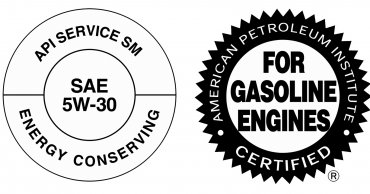The American Petroleum Institute increased fees for its engine oil licensing system last month to offset implementation costs for its forthcoming categories.
Effective Dec. 15, 2015, new applications and each annual renewal costs U.S. $4,000 – up from $3,000 – the institute announced in a recent letter to its licensees. It noted that the fees are per license, not per product, meaning that an oil marketer can submit one application for a range of oils. Upon renewal, applicants must report the volume of API-licensed oil sold. Each gallon in excess of 1 million incurs a fee of $0.0070, increased from $0.0050 per gallon.

Image: American Petroleum Institute
Licensed oils display one or both of API’s quality marks: the “starburst” certification mark signifies that an oil meets the latest standard developed by the International Lubricant Specification Advisory Committee (ILSAC), which represents American and Japanese automakers; the “donut” indicates an oil that meets the companion API specification that is siimilar to the ILSAC spec but includes fuel economy requirements. API certification is recognized in many global markets, including the Asia-Pacific region.
Two new diesel categories, API CK-4 and API FA-4, will be introduced in late 2016, and new gasoline engine oils categories are expected by early 2018. API will have to fund an educational campaign on the new categories and increase the number of oils tested to ensure on a broader scale the quality of licensed oils and those making API claims, Kevin Ferrick, Manager of Engine Oil Licensing and Certification, said in the letter. To offset the cost of these efforts, API must increase fees.
The Washington, D.C.-based institute said the fee increase will also allow it to draw more samples from the global market to audit oils making API performance claims, publish and regularly update an API unlicensed list, and take more action against nonconforming oils.
As high as 19 percent of the bulk oils it tested failed to meet API service category requirements, Ferrick added. These were bulk samples purchased from oil-change locations that likely believed they were receiving quality oils.
Some blenders in Asia have been unhappy with the institutes current perceived level of enforcement, and have been apprehensive about the fees. [The increase] will affect our margins and we have no choice but to pay up, a Singapore-based lube manufacturers CEO, requesting anonymity, told Lube Report Asia. API has not been vigilant in its enforcements, especially in China where the API marks are used without a license. This is not fair to us who are paying for the license and tests. API licensees are responsible for all testing to prove compliance with API and ILSAC specifications.
Smaller lubricant players just put what they want on the bottle and nothing is done. They dont pay for it, he added.
As of Jan. 15, there are a total of 737 API licensees, and 189 are in the Asia-Pacific region – up from 176 in the region in December 2014. We appear to be adding licensees in the Middle East and Asia, Ferrick told Lube Report Asia. A complete list of licensees is available at APIs website.